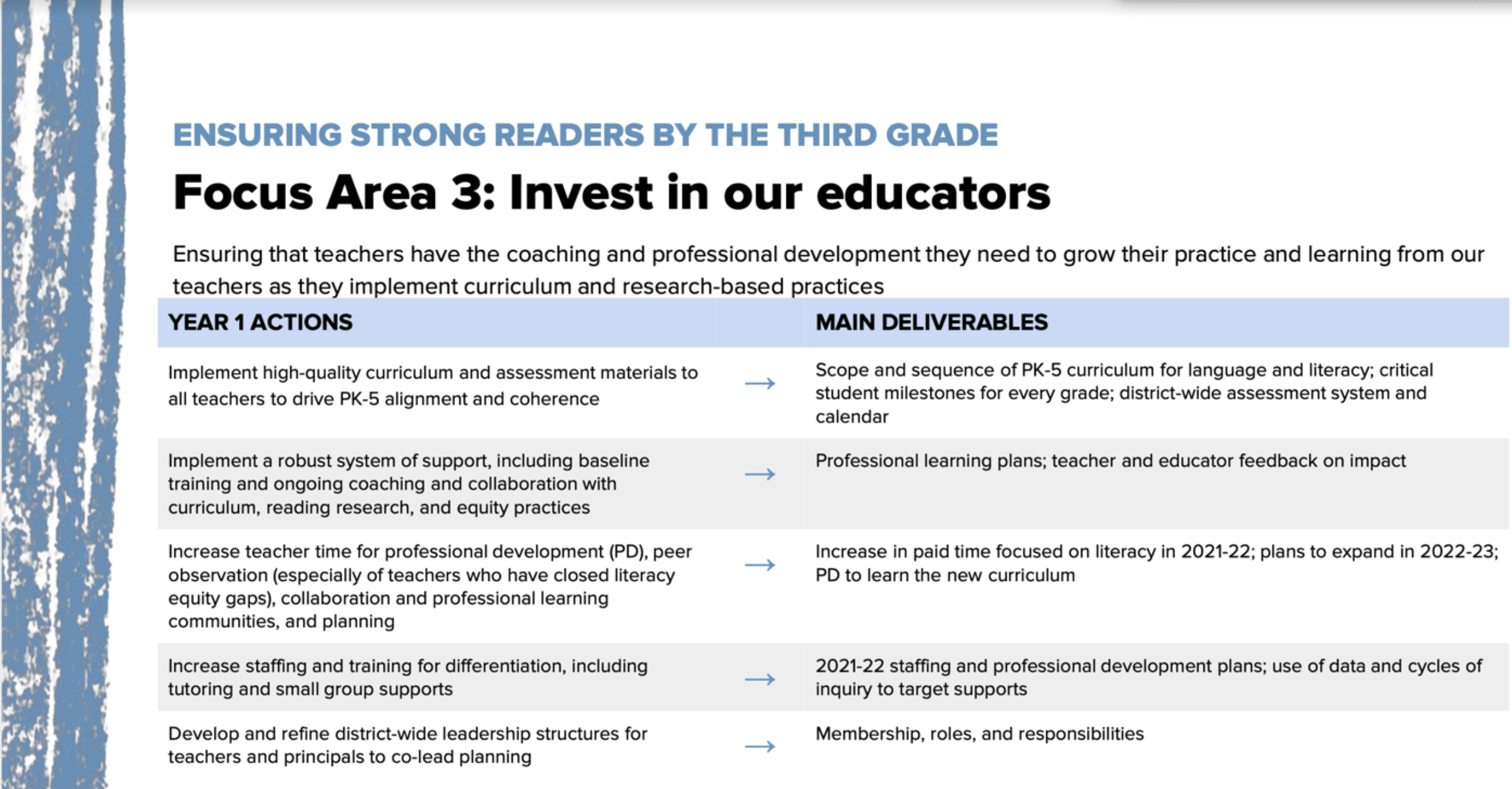Blog
OUSD Strategic Plan Blog Series #3: Invest in our Educators
Share
In this post, we continue our series breaking down the four focus areas of OUSD’s strategic plan initiative to ensure strong readers by the third grade. In previous posts we covered focus areas one and two.

In this blog post, we take a closer look at Focus Area #3: Invest in Our Educators—the district’s strategy to ensure educators are equipped to be literacy leaders in the classroom.
The Year 1 Actions and Main Deliverables for Focus Area 3 are outlined below:

| Year 1 Actions | Main Deliverables | |
| Implement high-quality curriculum and assessment materials to all teachers to drive PK-5 alignment and coherence | Scope and sequence of PK-5 curriculum for language and literacy; critical student milestones for every grade; district-wide assessment system and calendar | |
| Implement a robust system of support, including baseline training and ongoing coaching and collaboration with curriculum, reading research, and equity practices | Professional learning plans; teacher and educator feedback on impact | |
| Increase teacher time for professional development (PD), peer observation (especially of teachers who have closed literacy equity gaps), collaboration and professional learning communities, and planning | Increase in paid time focused on literacy in 2021-22; plans to expand in 2022-23; PD to learn the new curriculum | |
| Increase staffing and training for differentiation, including tutoring and small group supports | 2021-22 staffing and professional development plans; use of data and cycles of inquiry to target supports | |
| Develop and refine district-wide leadership structures for teachers and principals to co-lead planning | Membership, roles, and responsibilities |

Making the kinds of urgent and significant gains in student reading outcomes we need will require a systemic, citywide effort with a deep focus on instruction and changes within our school systems. Initiative 1 of the Strategic Plan, Ensuring Strong Readers by the 3rd Grade, highlights OUSD’s three-year strategy to make a significant impact in early literacy.
In our earlier posts in the blog series, we’ve talked about the ways in which teachers and schools are situated in the plan and responsible for most of the goals in the initiative. Teachers are spending the most time working directly with our children, preparing and delivering lessons, assessing our children’s development, and making decisions on the best ways to differentiate instruction for classrooms of students with different needs.
Two months prior to the OUSD School Board’s adoption of the new strategic plan, the Board voted to adopt EL Education as the English Language Arts curriculum for grades K-5. Given the heavy responsibility that teachers have in this effort, it is essential that they are provided the necessary and ongoing support throughout the strategic plan’s implementation.
As co-petitioners of the NAACP’s Administrative Petition to the OUSD, the OLC has and will continue to advocate for the investment and the strong support of our teachers. Following the NAACP’s Oakland Literacy Town Hall in March 2021, we published a blog post that outlined how to support and stand with teachers. Some of the Year 1 actions and deliverables included in focus area #3 are in alignment with our call for high quality professional development, and we will continue to urge heavy emphasis and support in this area.
In this and other focus areas, the scope of the strategic plan clearly notes that achieving the goals are not solely the responsibility of teachers, but the collective responsibility of all stakeholders involved. Focus area #3 includes language for OUSD leadership and school administration to work in collaboration with teachers in planning. It also includes incorporating support staff for differentiation of instruction.
Supporting Effective Instruction
In order to best support our teachers, we must start by first acknowledging the great and difficult work that they do. Coming into this year with all the new initiatives, teachers bring with them expertise and experiences that should be acknowledged and leveraged. It is also paramount that every one of our teachers must believe in what’s possible for our kids, and be invested in the change ahead.
A strong curriculum in every classroom is an important investment in teaching and learning. But curriculum alone will not create the change we need to see. Teachers deserve and require ongoing and effective training and coaching to successfully put the curriculum into practice.
In order for the new curriculum to support effective instruction for all OUSD students, the accompanying professional development must be responsive to the wide variety of social, cultural and structural conditions that exist across every classroom in which EL Education is being implemented and the varying levels of teachers’ experience and prior training.
In the effort to help us all better understand the successes and challenges that teachers are experiencing, the OLC will continue to make spaces to uplift the voices of teachers and educators and share their perspectives on what more is needed to support their success.
2021-22 Superintendent’s Work Plan Approved
At the August 25 Board Meeting, the Board voted to adopt the Superintendent’s 2021-2022 Work Plan – Item # 21-1788. The work plan which outlines the Superintendent’s priorities for the upcoming school year is closely aligned with the three-year strategic plan. For Initiative #1, the key deliverables noted in the work plan are as follows:
Develop a language and literacy Implementation Plan that includes 1) Curriculum Implementation Dashboard 2) Professional development plan to build capacity of teachers and leaders 3) Publicly-available literacy dashboard disaggregated by race/ethnicity 4) Calendar for literacy curriculum and training.
All deliverables noted in the work plan encompass meeting year one outcomes of all four focus areas outlined in Initiative #1. Along with helping understand the relationship between the work plan and the strategic plan, The OLC will continue to track and report on the progress of the work plan. Similar to the strategic plan, we will help to identify ways in which the community can engage and take action as the work plan is implemented.



